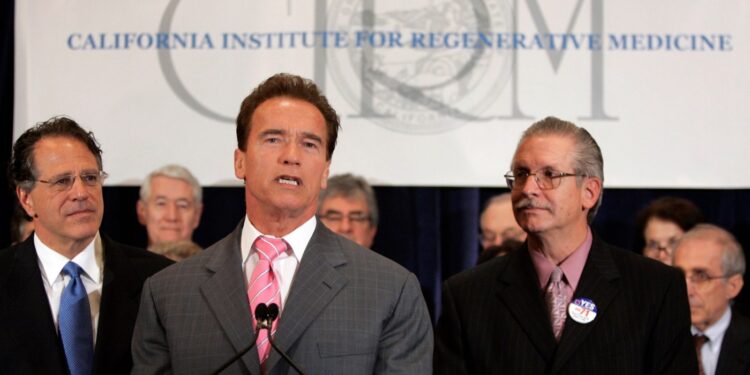
“There are a wide variety of diseases that CIRM-funded scientists are working on, including those that pose the greatest threat to Americans. These include heart disease, stroke, cancer, diabetes, Alzheimer’s and Parkinson’s disease, among others,” reads the website of the California Institute for Regenerative Medicine (CIRM). Readers might dial it back 20 years to the 2004 election.
Californians faced a vote on Proposition 71, the Stem Cell Research Initiative. The measure promised life-saving cures and therapies for Alzheimer’s, Parkinson’s and other diseases through embryonic stem cell research. Actor Michael J. Fox said in an ad:
“71 will support research to find cures for diseases that affect millions of people, including cancer, diabetes, Alzheimer’s and Parkinson’s. Please support the effort to find cures. . . It could save the life of someone you love.” Christopher Reeve also got in the act.
“My foundation supports cutting edge research. And we are proud supporters of Prop 71,” Reeve said in the ad. “Stem cells have already cured paralysis in animals. Stem cells are the future of medicine. Please support Prop 71. And, stand up for those that can’t.”
The measure also got strong backing from Republican Gov. Arnold Schwarzenegger, whose father-in-law, Sargent Shriver, was afflicted with Alzheimer’s. With this all-star lineup, the measure passed 59.5 to 40.95 but there was more to it than grandiose promises.
Proposition 71 delivered $3 billion for California researchers and created the California Institute for Regenerative Medicine (CIRM). The prime mover was Democrat insider and real estate tycoon Robert Klein, who wrote the measure to install himself as chairman, and required a 70 percent supermajority of both houses to make any structural or policy changes.
In 2012, the Institute of Medicine, a division of the National Academy of Sciences, found that almost all CIRM board members were “interested parties with a personal or financial stake in the allocation of CIRM fundings.” As the investigators learned, CIRM was directing a full 91 percent of its research funding to institutions with representatives on its governing board. This seems to have escaped the attention of state attorney general Kamala Harris.
According to Klein, the life-saving cures would generate a steady stream of royalties that would make CIRM self-supporting. Trouble was, the state stem-cell agency reported no royalties until 2018, and only in the amount of $190,345.87. That is less than the salary of former state senator Art Torres, the non-scientist CIRM hired when a biotech professional was willing to work for no salary at all.
That same year, according to the San Francisco Chronicle, “not a single federally approved therapy has resulted from CIRM-funded science. The predicted financial windfall has not materialized.” With royalties only chump change and none of the promised cures in the offing, the institute went back to the voters. By this time celebrity support had diminished, but CIRM bosses made a plan.
Americans for Cures, a non-profit headed by Robert Klein, floated Proposition 14, the Stem Cell Research Institute Bond Initiative, this time for $5.5 billion in general obligation bonds. As this writer twice verified, signature gatherers falsely claimed the measure sought only $1.5 billion.
As the deadline approached, Americans for Cures vice president Don Reed began pushing for people to print out 16 pages and mail in the signatures. This was an open invitation to fraud, but
Secretary of State Alex Padilla duly approved the measure for the November 2020 ballot.
Proposition 14 passed by 51.09% to 48.91%, a far cry from 2004. Twenty years and many billions of dollars later, CIRM-funded scientists are “still working” on the cures. In effect, CIRM has come to stand for California Institute for the Redistribution of Money. If taxpayers thought that was the case from the start it would be hard to blame them.
Lloyd Billingsley is a policy fellow at the Independent Institute in Oakland, Calif.







